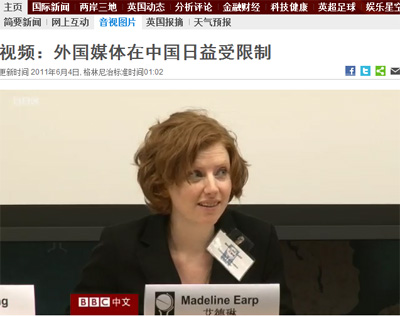I was in London on Friday, speaking at a seminar joint-hosted by the BBC Chinese service and the British think tank Chatham House called “Media Freedom in China and the Role of International Broadcasters.” There was a lot of impassioned discussion about the range of challenges facing international broadcasters, from slashed budgets to the recent press freedom crackdown. (Chinese speakers can watch my presentation on the BBC website.)
A number of people noted that Friday was June 3, the day before the anniversary of another, far more serious crackdown in Tiananmen Square back in 1989, when troops opened fire on student-led anti-government protesters in Beijing. It would be wrong to compare today’s situation, where pressure on journalists manifests as detentions, extralegal disappearances, and surveillance, to the events of that spring, when thousands of people lost their lives. Still, the restrictions on discussing Tiananmen in the intervening 22 years have paved the way for authorities to limit other discussions, on ethnic unrest, politics and, most recently, the Jasmine Revolution.
Censorship certainly mounts during the week of June 4. Internet users post a correspondingly large amount of Tiananmen references, to keep the information authorities busy, as the California-based China Digital Times documented this week. But what’s particularly chilling this year is how ordinary that activity looks. Perhaps China’s most recent “sensitive” period did begin last Friday. Then again, perhaps it began in February in response to online calls for a Chinese Jasmine Revolution. Or the October before, with the awarding of the Nobel Peace Prize to imprisoned writer Liu Xiaobo.
Journalists in China, working for local as well as international outlets, have told me their working environment is in constant flux: You just learn to keep your head down during the sensitive phases until the next relaxation. But with hypersensitive political leadership changes anticipated in 2012, it’s not clear when that will come.
The media freedom situation I outlined in my comments at Chatham House on Friday has evolved, even improved, in the past two to three decades under Communist rule. But if all it takes is a moment of sensitivity to bring down hefty information controls, including arrests and imprisonments, then it’s not enough. Journalists in China deserve more. When they can hold a Chinese-language discussion on media freedom on the eve of the June 4 anniversary in Beijing without repercussions, maybe then we’ll know that the sensitive era has finally come to an end.
